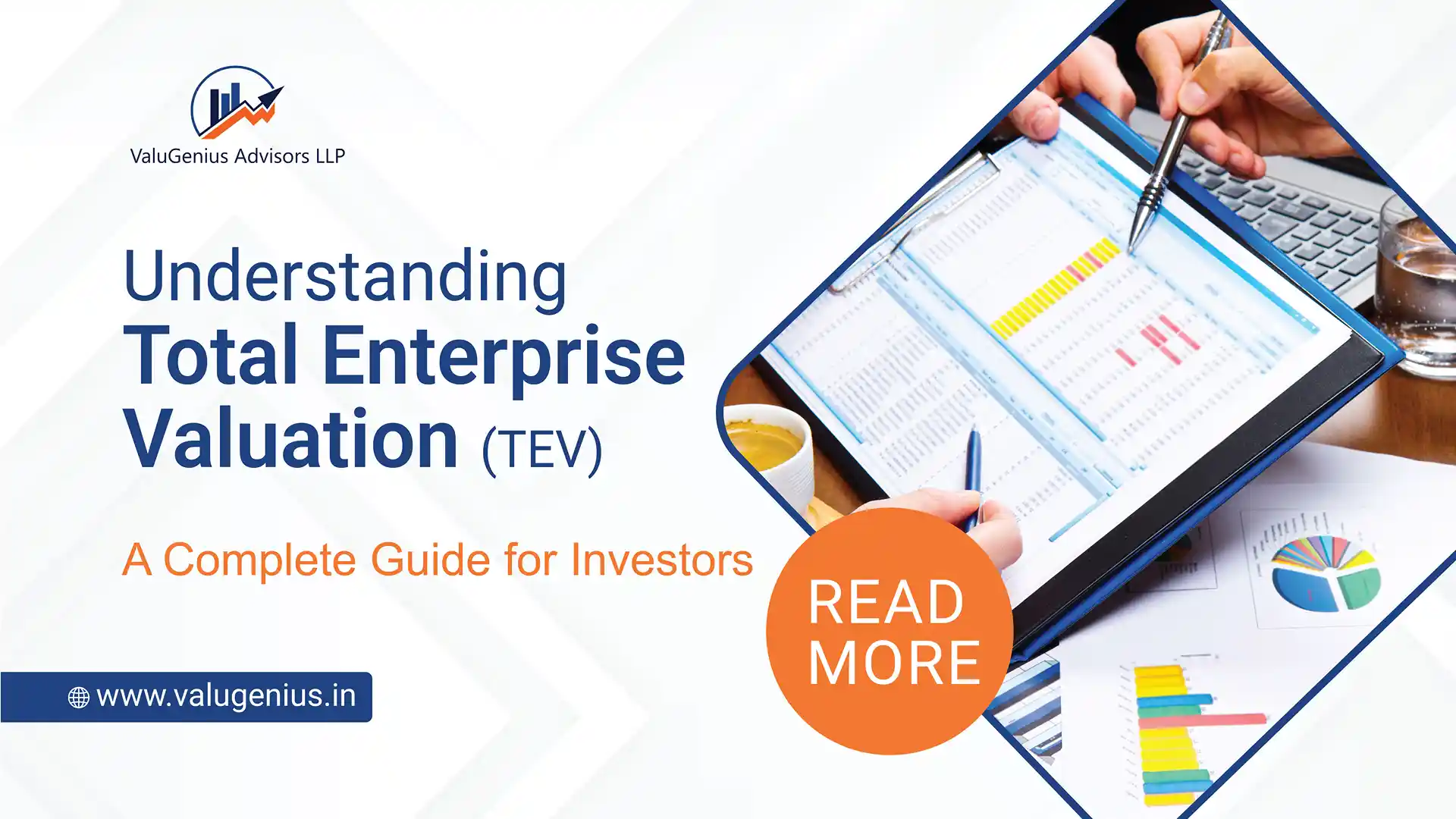
Understanding Total Enterprise Valuation (TEV) – A Complete Guide for Investors
By ValuGenius
When professionals talk about valuing a business, terms like market capitalization often pop up. But there’s a smarter, more comprehensive way to understand a company’s true worth: Total Enterprise Valuation (TEV). If you’ve ever wondered how investors or financial planners in Mumbai and across India figure out the real cost of a company, TEV is your answer.
What is Total Enterprise Value (TEV)?
Think of TEV as the full price tag of a company—not just what its stock is worth. TEV combines:
- The equity value (the value of all shares)
- The company’s debt
- Preferred stock, which is a special type of hybrid security
- Minus the company’s cash and cash equivalents
In simpler words, TEV tells us what someone would actually pay to buy a company today, including settling its debts, while also considering any cash the company already has.
This makes TEV a more complete measure than just looking at a company’s stock price. For example, two companies may both have a market capitalization of $100 million—but if one has $50 million in debt and the other has $10 million cash, their TEVs differ widely:
- Company A: $100M + $50M debt – $0 cash = $150M TEV
- Company B: $100M + $0 debt – $10M cash = $90M TEV
So, even if stocks look similar, the real value is quite different.
“I realized how misleading market cap alone could be,” shares a Mumbai-based financial analyst. “TEV gives a much clearer picture of what acquiring a company truly costs.”

Why TEV Matters
TEV is essential for valuation business decisions such as:
- Mergers & Acquisitions (M&A): Helps determine the real purchase price of a company.
- Comparing companies: Allows investors to fairly compare companies with different debt levels.
- Investment planning: Used by financial analysts to normalize valuation metrics like EV/EBITDA (Enterprise Value ÷ Earnings Before Interest, Taxes, Depreciation, and Amortization).
Simply put, TEV goes beyond stock prices to consider the company’s overall financial health, including debt and cash.
How to Calculate Total Enterprise Value (TEV)
Here’s the basic formula:
TEV=Market Capitalization+Debt+Preferred Stock−Cash and Cash Equivalents\text{TEV} = \text{Market Capitalization} + \text{Debt} + \text{Preferred Stock} – \text{Cash and Cash Equivalents}TEV=Market Capitalization+Debt+Preferred Stock−Cash and Cash Equivalents
- Market Capitalization: Total value of a company’s stock
- Debt: Money the company owes to lenders
- Preferred Stock: Treated like debt because it has priority over common stock
- Cash & Cash Equivalents: Subtracted since cash reduces the net cost to acquire the company
For example, if a company has:
- Market Cap = ₹500 crore
- Debt = ₹200 crore
- Preferred Stock = ₹50 crore
- Cash = ₹100 crore
Then TEV = 500 + 200 + 50 – 100 = ₹650 crore
This number tells potential investors or acquiring companies how much it truly costs to take over this business.
TEV vs. Market Capitalization
Many financial planners in Mumbai and across India still use market capitalization to measure company value. But TEV is often more reliable because it accounts for debt and cash.
Fun fact: According to a 2024 report by Statista, over 70% of Indian companies with market caps over ₹1,000 crore had debts exceeding ₹300 crore, making TEV crucial for accurate valuation.
TEV in Financial Planning
Financial planning companies in Mumbai, like ValuGenius, use TEV to:
- Advise clients on acquisitions
- Assess investment potential
- Compare companies across industries fairly
For example, if you’re planning to invest in a tech startup versus a manufacturing firm, TEV lets you see beyond stock prices and understand the company’s actual financial structure.

Why Cash and Debt Matter
- Cash reduces TEV: More cash means the acquiring firm effectively pays less.
- Debt increases TEV: Higher debt adds to the cost of acquisition.
Interestingly, some companies may even have a negative TEV if their cash reserves exceed the sum of their market cap and debt—making them extremely attractive for investors.
Bottom Line
Total Enterprise Value (TEV) is one of the smartest tools for understanding what a company is really worth. It goes beyond market capitalization, factoring in both debts and cash, and gives investors, business owners, and financial planners a realistic view of a company’s value.
For anyone looking to explore valuation in India or work with expert financial planning companies in Mumbai, ValuGenius offers detailed insights and hands-on guidance to help you make informed business and investment decisions.
Key Statistics
- Over 70% of large Indian companies have significant debts affecting their TEV (Statista, 2024).
- Companies with higher cash reserves can reduce their TEV and become more attractive acquisition targets.
Related Services by ValuGenius:
- Business Valuation Services
- Financial Planning for Corporates and Individuals
- M&A Advisory and Due Diligence

ValuGenius simplifies complex financial concepts like TEV, helping businesses and investors make smarter decisions in India’s dynamic market.
